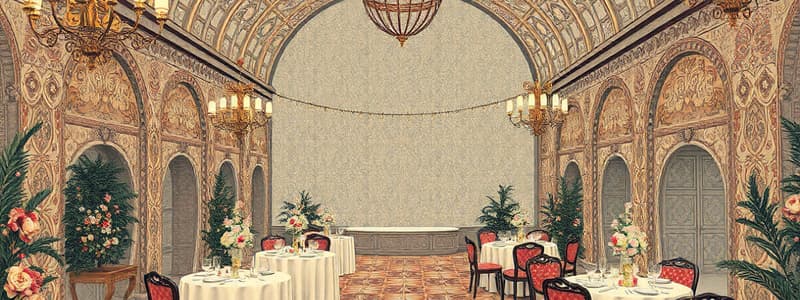Podcast
Questions and Answers
What is the primary purpose of an incentive event?
What is the primary purpose of an incentive event?
- To gather opinions on specific issues.
- To facilitate problem-solving discussions.
- To host educational sessions.
- To reward individuals for meeting or exceeding goals. (correct)
How does a conference differ from a convention?
How does a conference differ from a convention?
- A convention focuses solely on marketing and sales goals.
- A convention requires no organization in planning activities.
- A conference is designed for constructive discussions and problem-solving. (correct)
- A conference is typically larger and more formal than a convention.
Which of the following statements is true regarding the characteristics of a conference?
Which of the following statements is true regarding the characteristics of a conference?
- Conferences require tradition and continuity.
- Conferences are often smaller in scale compared to congresses. (correct)
- Conferences are periodic gatherings held exclusively for socializing.
- Conferences involve public assembly for educational purposes.
What type of events are categorized based on their purpose as 'commune'?
What type of events are categorized based on their purpose as 'commune'?
What is the definition of a mega event?
What is the definition of a mega event?
Which of the following best describes a convention?
Which of the following best describes a convention?
Which of these options is NOT a type of event based on its purpose?
Which of these options is NOT a type of event based on its purpose?
What is true about the process of event planning?
What is true about the process of event planning?
What significant development occurred during the 19th century that facilitated organized meetings?
What significant development occurred during the 19th century that facilitated organized meetings?
Which of the following terms refers to a large public celebration focused on culture or art?
Which of the following terms refers to a large public celebration focused on culture or art?
What role does a delegate play in a convention or event?
What role does a delegate play in a convention or event?
What technological advancements were particularly influential in the late 20th century for event planning?
What technological advancements were particularly influential in the late 20th century for event planning?
Which of the following best describes a panel discussion?
Which of the following best describes a panel discussion?
What milestone event in the early 20th century addressed global issues of trade and diplomacy?
What milestone event in the early 20th century addressed global issues of trade and diplomacy?
Which of the following is NOT considered a type of corporate event?
Which of the following is NOT considered a type of corporate event?
What recent technological advances in the early 21st century impacted event management?
What recent technological advances in the early 21st century impacted event management?
What is the primary role of event planners?
What is the primary role of event planners?
Which of the following factors should be considered in forecasting costs for an event?
Which of the following factors should be considered in forecasting costs for an event?
What is the purpose of structured sessions in networking?
What is the purpose of structured sessions in networking?
How is the contingency fund calculated if the total event budget is $7,700?
How is the contingency fund calculated if the total event budget is $7,700?
What kind of opportunities does informal networking provide during an event?
What kind of opportunities does informal networking provide during an event?
What is a recommended method for managing pre-event communication?
What is a recommended method for managing pre-event communication?
To calculate what 25% of $7,000 is, the result is:
To calculate what 25% of $7,000 is, the result is:
What function does a networking platform serve during an event?
What function does a networking platform serve during an event?
What is an example of a fixed expense in event planning?
What is an example of a fixed expense in event planning?
Which of the following best describes a panel discussion?
Which of the following best describes a panel discussion?
Which of the following roles is included in the formulation of event committees?
Which of the following roles is included in the formulation of event committees?
What is a common use of gratuities in event settings?
What is a common use of gratuities in event settings?
Which of the following is a variable expense related to event planning?
Which of the following is a variable expense related to event planning?
What arrangement is commonly employed in a theater or auditorium setup?
What arrangement is commonly employed in a theater or auditorium setup?
What is a key feature of breakout sessions during events?
What is a key feature of breakout sessions during events?
What is the purpose of a contract in event planning?
What is the purpose of a contract in event planning?
What is the main advantage of a lecture type setup in event design?
What is the main advantage of a lecture type setup in event design?
Which setup is most suitable for small lectures and workshops requiring note-taking?
Which setup is most suitable for small lectures and workshops requiring note-taking?
What is a key benefit of using a well-chosen theme for an event?
What is a key benefit of using a well-chosen theme for an event?
What is a disadvantage of the Schoolroom setup in event planning?
What is a disadvantage of the Schoolroom setup in event planning?
What role does visual design play in event environments?
What role does visual design play in event environments?
Which layout encourages discussions and interactions among participants?
Which layout encourages discussions and interactions among participants?
What is the primary purpose of effective space planning in an event?
What is the primary purpose of effective space planning in an event?
How does a well-chosen theme contribute to branding and messaging in events?
How does a well-chosen theme contribute to branding and messaging in events?
Flashcards are hidden until you start studying
Study Notes
Incentives
- An incentive is a reward for meeting or exceeding goals, like sales or production.
- It is also called an Incentive Program.
Conferences
- A conference is a meeting for discussion, fact-finding, problem-solving, and consultation.
- Organizations use them to exchange views, open debates, and gain publicity.
- They have no tradition, continuity, or periodicity requirement.
- Conferences are smaller in scale than congresses.
Conventions
- A convention is a gathering focused on educational sessions, discussions, socializing, and organized events.
- They frequently include exhibits.
- Congress is Europe’s term for convention.
Events Management
- One professional course in tourism and hospitality programs is Events Management.
- It can be found in some business management programs.
- It involves the research, design, planning, coordination, and evaluation of events.
Event Types (By Purpose)
- Celebrate: Emphasizes a special occasion.
- Commune: Encourages interaction and shared experiences.
- Commerce: Focuses on business transactions.
- Convene: Brings people together for a specific purpose, like a meeting.
Event Types (By Impact)
- Mega Events: The largest events that can be organized.
MICE Tourism History
- 19th Century: Industrialization and urbanization led to the need for organized meetings.
- Early 20th Century: International conferences and conventions emerged, addressing global issues like trade, science, and diplomacy. The establishment of the League of Nations in 1920 marked a significant milestone.
- Late 20th Century: New technologies like fax machines and personal computers revolutionized event planning and management. Specialized MICE agencies and convention centers grew in popularity.
- Early 21st Century: Technology advancements like the internet, mobile technology, and event management software transformed the industry.
DEI
- Stands for Diversity, Equity, and Inclusion.
MICE Terminology
- Delegate: A representative of a company or organization at a convention, often participating as a speaker or attendee.
- Corporate Event: Events organized by businesses, typically for clients, employees, or stakeholders. Examples include product launches, seminars, and company celebrations.
- Panel Discussions: Structured discussions with a group of experts or thought leaders, often followed by Q&A.
- Festival: Large public celebrations centered around culture, art, or a specific theme, featuring performances, exhibitions, and social activities.
- Gala: A formal event, often centered around a specific cause or celebration, featuring entertainment, dining, and elaborate decor.
Load-in/Load-out Ingress/Egress
- The process of setting up and dismantling an event, including moving equipment, decorations, and supplies into and out of the venue.
Event Planners
- Professionals responsible for organizing, coordinating, and executing all aspects of an event. Their role encompasses logistics, vendor coordination, budget management, and attendee experience.
Venue
- The physical location where an event takes place.
Networking
- Strategies to foster connections and relationships among attendees. Examples include:
- Structured Sessions: Dedicated networking events like meet-and-greets and roundtables.
- Informal Opportunities: Breaks, meals, and social gatherings where attendees connect organically.
- Networking Platform: Mobile apps or online platforms facilitating communication and contact exchange.
Managing Communication
- Pre-Event Communication: Providing attendees with regular updates, information about changes, and pre-event materials like agendas, speaker bios, and preparatory documents.
Breakout Sessions
- Meetings focused on specific topics. They often run simultaneously in different meeting rooms, offering delegates a choice of sessions to attend.
Panel Discussions
- Facilitated conversations with industry experts, guest speakers, and audience participation, moderated by a designated person.
Forecasting
- Anticipating potential cost changes and planning for contingencies.
- Factors to consider include inflation, market fluctuations, and potential changes in attendee numbers.
Contingency Computation
- A percentage of the event budget set aside for unforeseen expenses.
- Calculating a 10% contingency fund for a 7,000budgetwouldbe7,000 budget would be 7,000budgetwouldbe700 (7,000 * 0.10).
Fixed Expenses
- Costs not dependent on attendee numbers. Examples include:
- Administrative fees
- Postage and printing
- Advertising and promotion
- Staff travel
- Speaker fees
- Contracts with suppliers like audiovisual firms
Variable Expenses
- Costs that fluctuate based on attendee numbers. Examples include:
- Venue rental fees
- Monthly internet expense
- Meals
- Gifts and tokens
- Gasoline expense
- Office supplies
Gratuities
- Tips given for good service, usually in the form of money.
Contracts
- Legal documents outlining responsibilities of all involved parties.
- Written and signed after negotiations are complete.
Formulating Committees
- The typical composition includes:
- Event Manager / Director
- Assistant Event Manager
- Digital Committee
- Technical Committee
- Secretariat
Developing Engaging Event Themes
- Themes serve a crucial purpose in event management, contributing to:
- Cohesion: Ensuring that all elements of the event, from decor to activities, align with a central idea, creating a unified experience.
- Engagement: Captivating attendees and enhancing their experience while making the event memorable.
- Branding and Messaging: Clearly conveying the event's objectives and messages, reinforcing the event's purpose and the brand's identity.
Designing Impactful Event Environments
- Space Planning: Efficient layouts and zoning ensuring smooth attendee flow and optimal space utilization.
- Visual Design: Carefully selected colors, decor, and branding components creating visually appealing environments aligned with the event theme.
Theater/Auditorium Setup
- Functional setting: Suitable for large groups, involving chairs arranged in rows (straight or semicircle)
- Ideal for lecture-style meetings, accommodating numerous participants.
Schoolroom/Classroom Setup
- Conducive to note-taking: Facilitates reading materials or working on projects
- Suitable for smaller lectures and workshops where note-taking is essential.
- Advantages: Large amount of space per person, good for note-taking.
- Disadvantage: Poor visibility from the back of the room.
Hollow Square, U-Shape, and Herringbone Layout
- Ideal for: Board meetings, management meetings, and small group discussions.
- Advantage: Encourages discussions and interaction among participants.
Studying That Suits You
Use AI to generate personalized quizzes and flashcards to suit your learning preferences.




